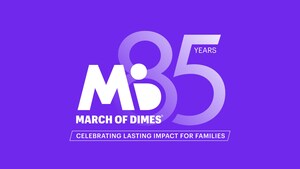New Power Of Personalized Medicine For Baby Described At March Of Dimes Luncheon
Targeted Genome Tests Can Help Guide Treatment Decisions
WHITE PLAINS, N.Y., Dec. 11, 2013 /PRNewswire-USNewswire/ -- The ability to analyze a hospitalized newborn's genome within hours rather than weeks is helping doctors diagnose babies' illnesses and provide treatment that is individualized to an infant's specific genetic makeup and metabolism.
(Logo: http://photos.prnewswire.com/prnh/20130214/DC59689LOGO)
Two experts in the field of genomics will discuss personalized medicine for newborns at a luncheon today for reporters sponsored by the March of Dimes. They will explain how personalized medicine can and is being used in neonatal intensive care units (NICUs) and its potential to change how newborns are treated.
Dr. Stephen Kingsmore, director of the Center for Pediatric Genomic Medicine at Children's Mercy Hospital in Kansas City, Missouri, will discuss his research that allows for inexpensive, targeted genome sequencing for babies to be completed in hours, compared to the weeks it previously took. His findings helps end parents' medical odyssey for a diagnosis, and guides treatment decisions. Dr. Bruce Carleton, professor in the University of British Columbia's pediatrics department and director of the Pharmaceutical Outcomes Programme at British Columbia's Children's Hospital in Vancouver, Canada, will present his research on how targeted genome sequencing can be used to prevent bad or unwanted reactions to medications by identifying sequence variations that predispose the individual to these outcomes.
The Human Genome Project, which in 2003 identified nearly all of the genes in human DNA, offered the promise of personalized genomic medicine. Genome sequencing – decoding and providing a detailed description of the order of the nucleotides (chemical building blocks) of an individual's DNA – can be a powerful tool for diagnosing rare and common genetic disorders, the speakers said. Not only can genome sequencing help guide treatment decisions and allow for preventative measures to be taken earlier than ever before, it can actually change treatment and help health care providers better manage a condition.
"Genetic diseases result from a mistake in the DNA code," says Dr. Kingsmore. "Identifying those mistakes in the vastness of the genome is difficult. But once you have a genetic diagnosis, the focus can shift to treatments that target the underpinning mechanism and outcomes. Our work helps get to that point in days."
"Most drug research focuses on adults, and rarely does one investigate the adverse drug reactions a medication might have on a newborn," says Dr. Carleton. "Targeted genome sequencing will let us know which babies will be harmed rather than helped by a drug treatment."
In 2013, the March of Dimes celebrated its 75th Anniversary and its ongoing work to help babies get a healthy start in life. About 4 million babies are born each year in the United States, and all have benefitted the March of Dimes life saving research and education.
The March of Dimes is the leading nonprofit organization for pregnancy and baby health. With chapters nationwide and its premier event, March for Babies, the March of Dimes works to improve the health of babies by preventing birth defects, premature birth and infant mortality. For the latest resources and information, visit marchofdimes.com or nacersano.org. Find us on Facebook and follow us on Twitter.
SOURCE March of Dimes
WANT YOUR COMPANY'S NEWS FEATURED ON PRNEWSWIRE.COM?
Newsrooms &
Influencers
Digital Media
Outlets
Journalists
Opted In





Share this article